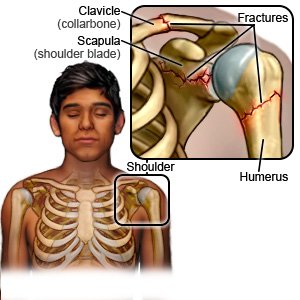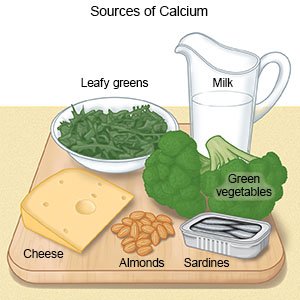Shoulder Fracture in Children
Medically reviewed by Drugs.com. Last updated on Aug 4, 2025.
A shoulder fracture is a break in a shoulder bone. The shoulder bones include the humerus (arm bone), scapula (shoulder blade), and clavicle (collarbone). Treatment will depend on your child's age, the location of the fracture, and how severe the fracture is. It may take several weeks for your child's fracture to heal.
 |
DISCHARGE INSTRUCTIONS:
Return to the emergency department if:
- Your child's pain gets worse, even after he or she rests and takes pain medicine.
- Your child's arm, hand, or fingers feel numb or cold and look pale.
- Your child's arm is swollen, red, and feels warm.
- Your child cannot move his or her hand or fingers.
Call your child's doctor if:
- Your child has a fever or chills.
- Your child's splint becomes damaged.
- You have questions or concerns about your child's condition or care.
Medicines:
Your child may need any of the following:
- NSAIDs , such as ibuprofen, help decrease swelling, pain, and fever. This medicine is available with or without a doctor's order. NSAIDs can cause stomach bleeding or kidney problems in certain people. If your child takes blood thinner medicine, always ask if NSAIDs are safe for him or her. Always read the medicine label and follow directions. Do not give these medicines to children younger than 6 months without direction from a healthcare provider.
- Acetaminophen decreases pain and fever. It is available without a doctor's order. Ask how much to give your child and how often to give it. Follow directions. Read the labels of all other medicines your child uses to see if they also contain acetaminophen, or ask your child's doctor or pharmacist. Acetaminophen can cause liver damage if not taken correctly.
- Prescription pain medicine may be given. Ask your child's healthcare provider how to give this medicine safely. Some prescription pain medicines contain acetaminophen. Do not give your child other medicines that contain acetaminophen without talking to a healthcare provider. Too much acetaminophen may cause liver damage. Prescription pain medicine may cause constipation. Ask your child's healthcare provider how to prevent or treat constipation.
- Do not give aspirin to children younger than 18 years. Your child could develop Reye syndrome if he or she has the flu or a fever and takes aspirin. Reye syndrome can cause life-threatening brain and liver damage. Check your child's medicine labels for aspirin or salicylates.
- Give your child's medicine as directed. Contact your child's healthcare provider if you think the medicine is not working as expected. Tell the provider if your child is allergic to any medicine. Keep a current list of the medicines, vitamins, and herbs your child takes. Include the amounts, and when, how, and why they are taken. Bring the list or the medicines in their containers to follow-up visits. Carry your child's medicine list with you in case of an emergency.
Care for your child:
- Use the sling or elastic bandage to prevent movement as directed. Instead, your child's healthcare provider may show you how to pin your child's sleeve to his or her chest. Only remove the sling, bandage, or pin to bathe or dress your child.
- Apply ice on your child's shoulder for 15 to 20 minutes every hour or as directed. Use an ice pack, or put crushed ice in a plastic bag. Cover it with a towel before you apply it to your child's skin. Ice helps prevent tissue damage and decreases swelling and pain.
- Have your child rest his or her shoulder as much as possible. Do not let your child put pressure on his or her shoulder or arm. Do not let your child use the arm to lift anything. Do not let your child do activities that may cause another injury. Examples include sports, riding a bike, or playing on the playground. Ask your child's healthcare provider when he or she can return to usual activities.
- Handle your child gently to prevent more injury. Gently turn your baby or small child. Do not pick up your baby or child by the arm.
- Take your child to physical therapy as directed. A physical therapist teaches your child exercises to help improve movement and strength, and to decrease pain.
Prevent a shoulder fracture:
- Have your child wear protective sports equipment that fit properly. Examples include shoulder pads and a chest protector.
- Feed your child foods high in calcium. Examples include milk, cheese, and yogurt. Calcium helps keep your child's bones strong.

Follow up with your child's doctor as directed:
Write down your questions so you remember to ask them during your visits.
© Copyright Merative 2025 Information is for End User's use only and may not be sold, redistributed or otherwise used for commercial purposes.
The above information is an educational aid only. It is not intended as medical advice for individual conditions or treatments. Talk to your doctor, nurse or pharmacist before following any medical regimen to see if it is safe and effective for you.
Further information
Always consult your healthcare provider to ensure the information displayed on this page applies to your personal circumstances.
